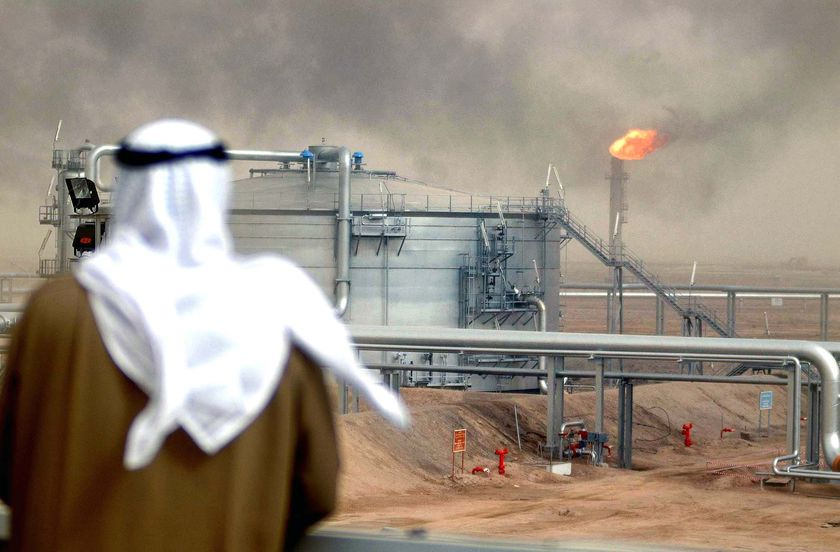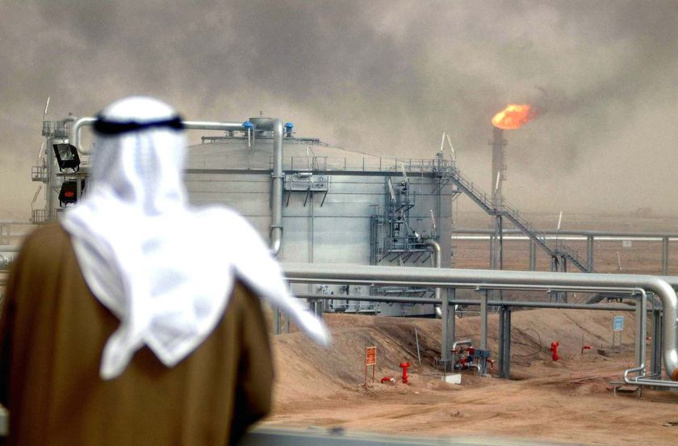However, as world oil prices are falling, the country’s gold reserves are melting, too. Although the stock still seems sufficient, authorities are announcing reforms, and are promoting the president's successor. Some talk about reforms to reduce the country's dependence on oil, or measures to reduce budget expenditures. Step by step, this policy destroys the lasting peace, which has become habitual for citizens.
Despite previous successes of the economy, real national wealth of the kingdom is shrinking. Oil revenues in the region have not been effectively converted into human capital, infrastructure and innovative capacity needed for growth of productivity and diversification of economic activities. As a result, Saudi Arabia needs not only to adapt to the "new normal" in oil prices, but also to develop a radically new economic model that will eliminate structural barriers to productivity and growth.
Hedge funds think that the Saudi central bank will be forced to revalue (raise rate of local currency against other) riyal. Head of PointState Capita Zach Schreiber, who bet $ 1 billion on falling oil prices, told investors in May that the Saudi riyal was "massively overvalued", and that the country has still "two or three years" before the currency "hits the wall".
In response, the government has curtailed many construction projects, forcing contractors to lay off workers. This year, protesting foreign workers set buses on fire demanding unpaid wages. Sharp jump prices for water spiraled into outrage in social networks, so that Minister of Water and Electricity was fired after his offer to people to dig their own wells if they are dissatisfied with prices.
The kingdom axed capital costs by more than 70% this year, to 75.8 billion riyals. Current expenditures, including salaries and public services, are projected to decline by 19%.
In addition, the kingdom's population almost doubled since 1990, and half of all Saudis are now under the age of 25 years. The private sector does not offer enough opportunities for 300,000 young people entering the labor market every year, especially for women. Oddly enough, proceeds from sale of oil per capita in Saudi Arabia are significantly lower than in the small Gulf States such as Qatar or Kuwait. Poverty and increasingly worried middle class are gradually becoming one of the kingdom’s headaches. In June, the Saudi government has set a target to reduce wage costs of 24 billion riyals ($ 6.4 billion) a year by 2020.
More recently, the country has introduced a new program called Vision 2030. The plan includes expansion of the country's mining industry, gold mining, phosphate mining of uranium deposits. Above that, the government is going to set up financial, technology and entertainment sectors. Another potential source of income is pilgrimage to Mecca, which annually attracts up to 2 million tourists. According to the Prophet's behest, each of 1.6 billion Muslims living in the world should at least once in their lives take part in the Hajj.
For business, lower costs mean less growth and fewer jobs. The only way to create new is to dismiss foreign workers and replace them with local ones. It's another part of Vision 2030, also known as the "Saudization". Saudis has been trying to sell it since the 1980s, yet hasn’t succeeded much.
Now, however, the government is putting pressure on companies. Foreign workers are cheaper, yet the government is levying fines and refusing to renew visas for foreign workers, if share of native workers in business registers falls below a certain percentage.
While reforms are progressing slowly, there is still a long way to prosperous life without oil. Lower energy subsidies, coupled with other measures (such as introduction of excise duty on tobacco and beverages in 2017, and VAT 5% - in 2018), according to IMF forecasts, will reduce the budget deficit in 2021 to 7.7% of GDP (given average forecast on oil prices). Non-oil budget deficit will fall from 39.3% to 33.1% of non-oil GDP. If the country implements its five-year plan for complete elimination of energy subsidies and other measures (including limited growth of salaries in the public sector), the budget deficit in 2021 will disappear. Still, non-oil deficit will still be around a quarter of non-oil GDP.
Despite the noble aims, it is unlikely that Vision 2030 will be fully implemented, and it is reasonable to assume that it will never be a panacea for Saudi Arabia’s countless financial problems.
Even some leading Saudis insist that this is more about changing the national way of life rather than about radical "overhaul" of the economy in such a short time.
source: cnn.com, project-syndicate.org, bloomberg.com
Despite previous successes of the economy, real national wealth of the kingdom is shrinking. Oil revenues in the region have not been effectively converted into human capital, infrastructure and innovative capacity needed for growth of productivity and diversification of economic activities. As a result, Saudi Arabia needs not only to adapt to the "new normal" in oil prices, but also to develop a radically new economic model that will eliminate structural barriers to productivity and growth.
Hedge funds think that the Saudi central bank will be forced to revalue (raise rate of local currency against other) riyal. Head of PointState Capita Zach Schreiber, who bet $ 1 billion on falling oil prices, told investors in May that the Saudi riyal was "massively overvalued", and that the country has still "two or three years" before the currency "hits the wall".
In response, the government has curtailed many construction projects, forcing contractors to lay off workers. This year, protesting foreign workers set buses on fire demanding unpaid wages. Sharp jump prices for water spiraled into outrage in social networks, so that Minister of Water and Electricity was fired after his offer to people to dig their own wells if they are dissatisfied with prices.
The kingdom axed capital costs by more than 70% this year, to 75.8 billion riyals. Current expenditures, including salaries and public services, are projected to decline by 19%.
In addition, the kingdom's population almost doubled since 1990, and half of all Saudis are now under the age of 25 years. The private sector does not offer enough opportunities for 300,000 young people entering the labor market every year, especially for women. Oddly enough, proceeds from sale of oil per capita in Saudi Arabia are significantly lower than in the small Gulf States such as Qatar or Kuwait. Poverty and increasingly worried middle class are gradually becoming one of the kingdom’s headaches. In June, the Saudi government has set a target to reduce wage costs of 24 billion riyals ($ 6.4 billion) a year by 2020.
More recently, the country has introduced a new program called Vision 2030. The plan includes expansion of the country's mining industry, gold mining, phosphate mining of uranium deposits. Above that, the government is going to set up financial, technology and entertainment sectors. Another potential source of income is pilgrimage to Mecca, which annually attracts up to 2 million tourists. According to the Prophet's behest, each of 1.6 billion Muslims living in the world should at least once in their lives take part in the Hajj.
For business, lower costs mean less growth and fewer jobs. The only way to create new is to dismiss foreign workers and replace them with local ones. It's another part of Vision 2030, also known as the "Saudization". Saudis has been trying to sell it since the 1980s, yet hasn’t succeeded much.
Now, however, the government is putting pressure on companies. Foreign workers are cheaper, yet the government is levying fines and refusing to renew visas for foreign workers, if share of native workers in business registers falls below a certain percentage.
While reforms are progressing slowly, there is still a long way to prosperous life without oil. Lower energy subsidies, coupled with other measures (such as introduction of excise duty on tobacco and beverages in 2017, and VAT 5% - in 2018), according to IMF forecasts, will reduce the budget deficit in 2021 to 7.7% of GDP (given average forecast on oil prices). Non-oil budget deficit will fall from 39.3% to 33.1% of non-oil GDP. If the country implements its five-year plan for complete elimination of energy subsidies and other measures (including limited growth of salaries in the public sector), the budget deficit in 2021 will disappear. Still, non-oil deficit will still be around a quarter of non-oil GDP.
Despite the noble aims, it is unlikely that Vision 2030 will be fully implemented, and it is reasonable to assume that it will never be a panacea for Saudi Arabia’s countless financial problems.
Even some leading Saudis insist that this is more about changing the national way of life rather than about radical "overhaul" of the economy in such a short time.
source: cnn.com, project-syndicate.org, bloomberg.com



















